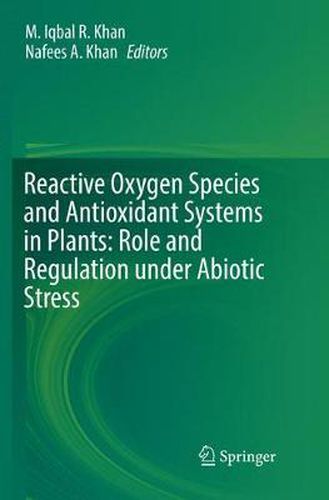Readings Newsletter
Become a Readings Member to make your shopping experience even easier.
Sign in or sign up for free!
You’re not far away from qualifying for FREE standard shipping within Australia
You’ve qualified for FREE standard shipping within Australia
The cart is loading…






This title is printed to order. This book may have been self-published. If so, we cannot guarantee the quality of the content. In the main most books will have gone through the editing process however some may not. We therefore suggest that you be aware of this before ordering this book. If in doubt check either the author or publisher’s details as we are unable to accept any returns unless they are faulty. Please contact us if you have any questions.
The present edited book is an attempt to update the state of art of the knowledge on metabolism of ROS and antioxidants and their relationship in plant adaptation to abiotic stresses involving physiological, biochemical and molecular processes. The chapters are much focused on the current climate issues and how ROS metabolism can manipulate with antioxidant system to accelerate detoxification mechanism. It will enhance the mechanistic understanding on ROS and antioxidants system and will pave the path for agricultural scientists in developing tolerant crops to achieve sustainability under the changing environmental conditions.
The increase in abiotic stress factors has become a major threat to sustainability of crop production. This situation has led to think ways which can help to come out with potential measures; for which it is necessary to understand the influence of abiotic stress factors on crops performance and the mechanisms by which these factors impact plants. It has now become evident that abiotic stress impacts negatively on plant growth and development at every stage of plant’s life. Plants adapt to the changing environment with the adjustment at physiological, biochemical and molecular levels. The possible mechanisms involved in the negative effects of abiotic stress factors are excess production of reactive oxygen species (ROS). They alter physiological and molecular mechanisms leading to poor performance of plants. Plants however, are able to cope with these adverse effects by inducing antioxidant systems as the priority. Nevertheless, the dual role of ROS has now been ascertained which provides an evidence for regulation of plant metabolism positively on a concentration-dependent manner. Under conditions of high ROS production, the antioxidant system plays a major role in diminishing the effects of ROS. Thus, ROS production and antioxidant system are interwoven with abiotic stress conditions. The antioxidants have the capacity to hold the stability in metabolism in order to avoid disruption due to environmental disturbances.
$9.00 standard shipping within Australia
FREE standard shipping within Australia for orders over $100.00
Express & International shipping calculated at checkout
This title is printed to order. This book may have been self-published. If so, we cannot guarantee the quality of the content. In the main most books will have gone through the editing process however some may not. We therefore suggest that you be aware of this before ordering this book. If in doubt check either the author or publisher’s details as we are unable to accept any returns unless they are faulty. Please contact us if you have any questions.
The present edited book is an attempt to update the state of art of the knowledge on metabolism of ROS and antioxidants and their relationship in plant adaptation to abiotic stresses involving physiological, biochemical and molecular processes. The chapters are much focused on the current climate issues and how ROS metabolism can manipulate with antioxidant system to accelerate detoxification mechanism. It will enhance the mechanistic understanding on ROS and antioxidants system and will pave the path for agricultural scientists in developing tolerant crops to achieve sustainability under the changing environmental conditions.
The increase in abiotic stress factors has become a major threat to sustainability of crop production. This situation has led to think ways which can help to come out with potential measures; for which it is necessary to understand the influence of abiotic stress factors on crops performance and the mechanisms by which these factors impact plants. It has now become evident that abiotic stress impacts negatively on plant growth and development at every stage of plant’s life. Plants adapt to the changing environment with the adjustment at physiological, biochemical and molecular levels. The possible mechanisms involved in the negative effects of abiotic stress factors are excess production of reactive oxygen species (ROS). They alter physiological and molecular mechanisms leading to poor performance of plants. Plants however, are able to cope with these adverse effects by inducing antioxidant systems as the priority. Nevertheless, the dual role of ROS has now been ascertained which provides an evidence for regulation of plant metabolism positively on a concentration-dependent manner. Under conditions of high ROS production, the antioxidant system plays a major role in diminishing the effects of ROS. Thus, ROS production and antioxidant system are interwoven with abiotic stress conditions. The antioxidants have the capacity to hold the stability in metabolism in order to avoid disruption due to environmental disturbances.